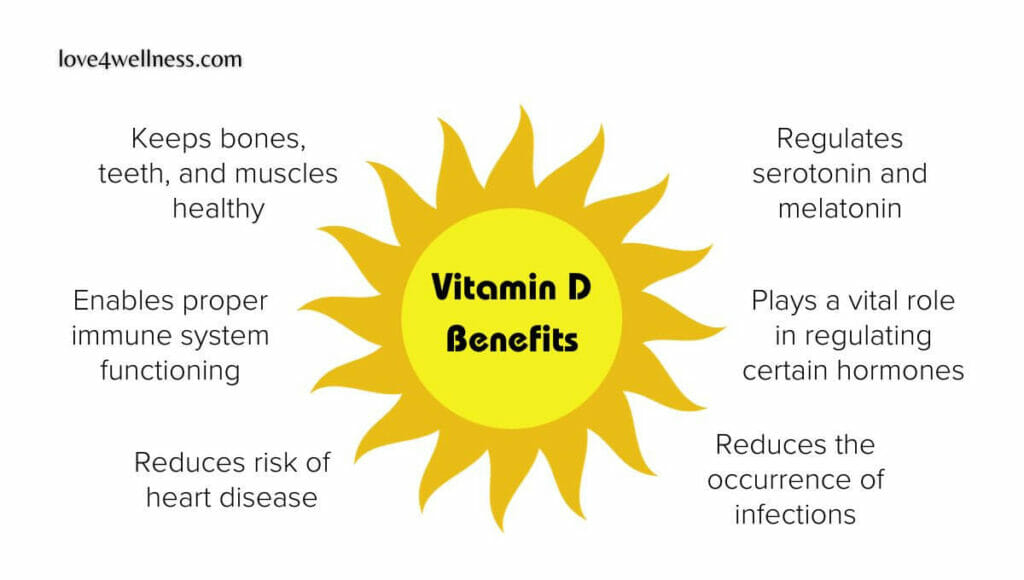Popularly known as the Sunshine vitamin, Vitamin D plays a significant role in your physical and mental health, some of which include ensuring bone health, enabling optimal functioning of the immune and digestive system, controlling serum calcium levels, and even being connected to positive moods. A deficit in vitamin D may cause subtle symptoms like frequent infections, and you hardly thought it was due to vitamin D deficiency! So, are you getting enough sunshine vitamin? If not, what are some unusual symptoms of vitamin D deficiency to look out for? Read on to learn.
Why does a vitamin D deficiency often go unnoticed?
The sunshine vitamin hugely impacts your physical and mental health. However, a deficiency is seldom identified early because the symptoms are typically subtle and may mimic common, everyday issues like fatigue or hair fall.
Not surprisingly, the importance of Vitamin D is often under-represented. However, this vitamin plays crucial roles in bone health, immune system health, hormonal health, skin and hair health, etc.
Hence, knowing the less-common vitamin D deficiency symptoms can help you address the problem early and maintain your general well-being.
What are the unusual symptoms of vitamin D deficiency?
Here are some unusual symptoms of vitamin D deficiency that you may fail to notice.
1. Persistent Fatigue
Do you feel tired unusually? It might not be just from overworking. Vitamin D deficiency may cause bone abnormalities and worsen muscle strength, thus causing prolonged fatigue.
2. Depression
When the blues linger, check your Vitamin D levels. Surprisingly, a deficiency can potentially impact your mood and emotional well-being, and several studies have proven that vitamin D supplements have improved people’s moods significantly.
3. Excessive Sweating
If you find yourself unusually sweating in excessive amounts, vitamin D deficiency may be causing it. Also, low vitamin D levels may cause more severe hot flashes and night sweats in menopausal women.
4. Slow Healing Wounds
Vitamin D helps in the process of wound healing in the human body. Hence, a deficiency of this essential nutrient may result in delayed healing, prolonging the recovery process.
5. Muscle Pain
Vitamin D helps the body absorb calcium effectively. Calcium helps muscles contract and relax, so low calcium levels can result in weakened muscles, causing muscle spasms, fatigue, and pain.
6. Frequent Infections
Almost all cells of the immune system have vitamin D receptors, which explains the importance of the sunshine vitamin in maintaining immune system health. Simply put, vitamin D directly interacts with immune cells responsible for fighting off viral and bacterial infections. So, if you are catching infections too often, check your vitamin D levels.
7. Hair Loss
Research shows that low vitamin D levels cause hair loss in both men and women. Vitamin D stimulates new hair follicles to grow, and a deficiency of the vitamin may result in reduced thickness and falling of hair.
8. Bone Loss
Since vitamin D impacts calcium absorption, it is connected to bone health also. A low vitamin D may lower bone density, resulting in frequent bone-related issues like fractures and joint pain.
9. Lower Back Pain
If you are under forty years old and experiencing lower back pain without any other significant spine issues, you may also need to check your vitamin D levels, as a deficiency might be causing the pain.
10. Poor Concentration
Are you unable to focus on a task effectively or struggle to stay focused longer? Low vitamin D levels can negatively impact cognitive health, causing symptoms like brain fog and reduced concentration.
What are the next steps if you have vitamin D deficiency?
If you doubt having vitamin D deficiency, you must get it confirmed with a doctor. Usually, this is done with a simple blood test. What are the next steps further?
- Follow the doctor’s advice
Your doctor may prescribe supplements to treat vitamin D deficiency. The supplements come in various forms, including pills, capsules, and drops. Take the appropriate dosage as advised by your doctor. Also, do not self-medicate, as under dosage will not treat the deficiency, and overdosage can cause severe harm to your health.
- Lifestyle changes
Including vitamin D-rich foods can improve the body’s vitamin D levels. Also, add healthy fats to every meal for optimal absorption of vitamin D because it is a fat-soluble vitamin. Additionally, regular exposure to sunlight can improve vitamin D levels. However, don’t expose yourself to the sun for longer, as it may cause skin problems, including skin cancer.
- Monitor regularly
Taking regular health checks can help you find vitamin D deficiency. If you are under 40, a yearly health check would suffice. If you are over 40, having bi-annual health checks is recommended.
Takeaway
Being aware of the less-common, unusual symptoms of Vitamin D deficiency, such as persistent infections, bone discomfort, and mood alterations, is important as they can silently impact your health.
Early recognition of these signs can lead to prompt intervention, preventing potential complications. You can manage this deficiency by adjusting your dietary intake, ensuring adequate exposure to sunlight, and following your doctor’s advice.
Prioritising your health is crucial, so take action upon noticing these unusual symptoms, and remember that your wellness deserves much-needed sunshine.
Images: canva.com



